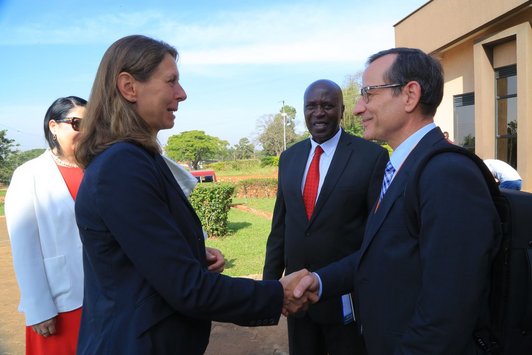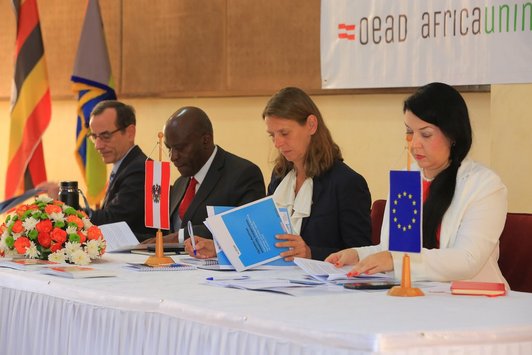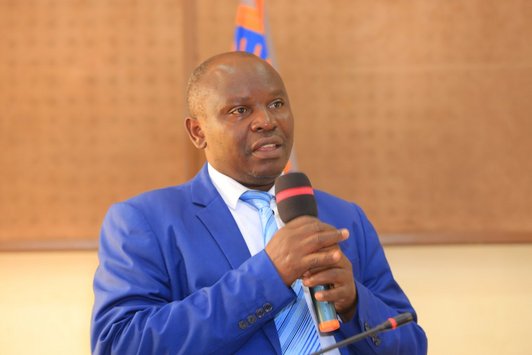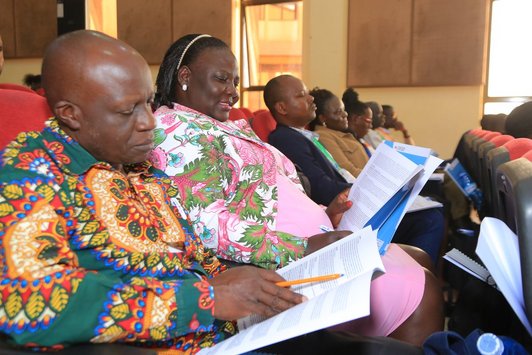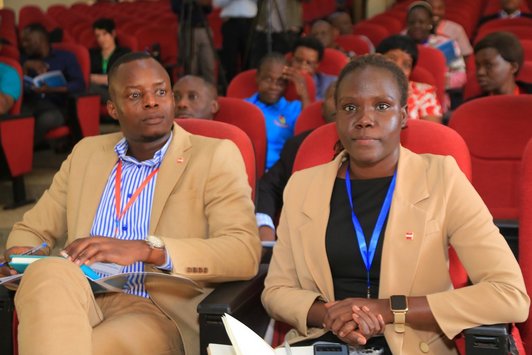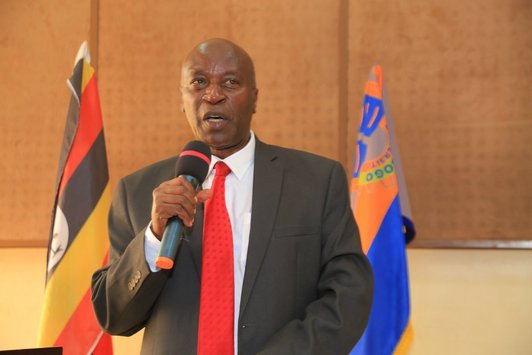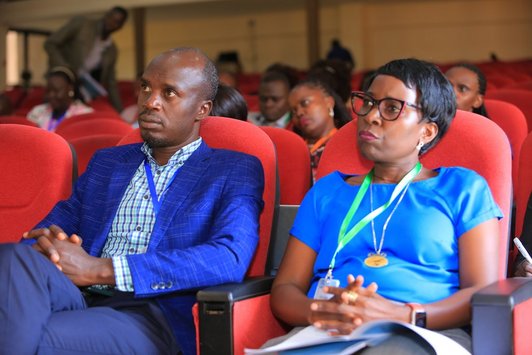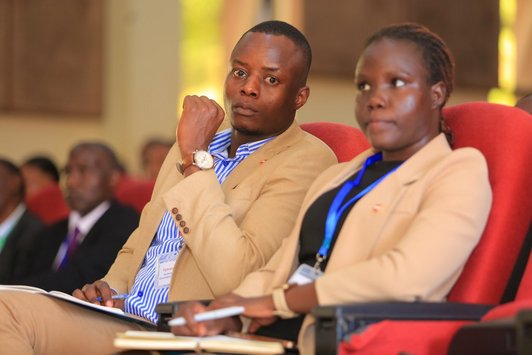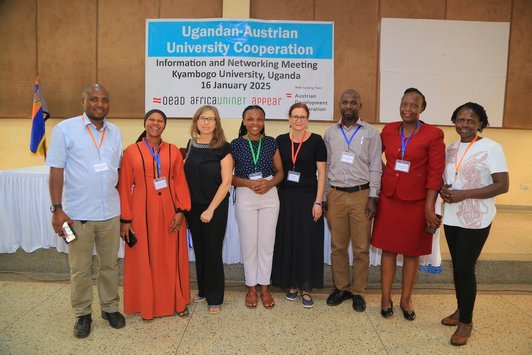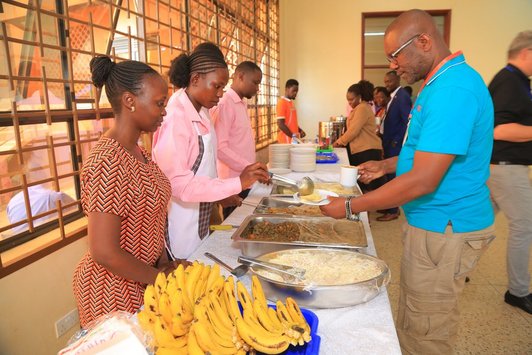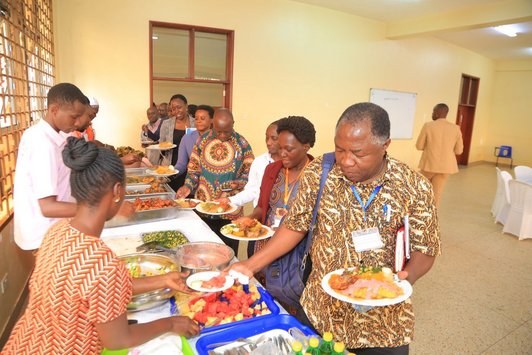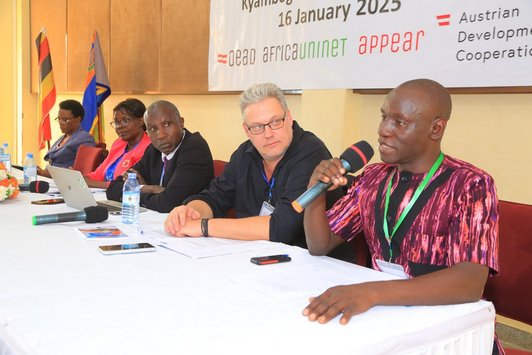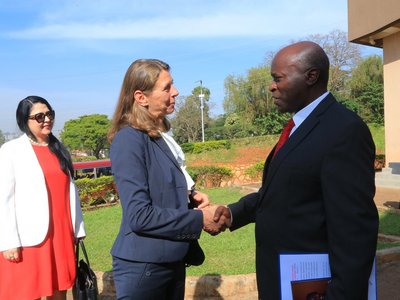

Opening and Welcome Remarks
The meeting commenced with the national anthems of Uganda, Austria, East Africa and Kyambogo University. The moderator Dr. Isaac Tibasiima introduced the Guests of Honour: Dr. Simone Knapp, Austrian Ambassador accredited to Uganda and Vice Chancellor Dr. Eli Katunguka-Rwakishaya, Kyambogo University. Furthermore, he welcomed distinguished staff members from the participating universities— including from Kyambogo University, Makerere University, Mountains of the Moon University, Uganda Martyrs University, and Muni University— as well as scholars and alumni.
Dean Assoc. Prof. Ediriisa Mugampoza from Kyambogo University introduced the programme, highlighting the longstanding collaboration between Ugandan and Austrian universities that has fostered impactful academic and research initiatives, along with vital capacity-building programmes. Many Ugandan scholars have pursued their studies in Austria and returned as influential multipliers, further strengthening institutional ties and promoting continued cooperation. He encouraged active participation and the exchange of insights, expressing gratitude to the team, expert speakers, and facilitators for sharing their knowledge and wished everybody an empowering and inspiring meeting. Emphasizing the significance of the gathering, he extended his best wishes for a successful meeting.
Mr. Ulrich Hörmann opened his speech by introducing Austria’s Agency for Education and Internationalisation (OeAD). Established in 1961, OeAD has played a pivotal role in supporting international education and research. In collaboration with the Austrian Development Cooperation, it has facilitated scholarship programmes for scholars from the Global South, with a strong focus on PhD studies. With a budget exceeding 130 million euros and a team of around 360 employees, OeAD is dedicated to advancing the internationalisation of higher education while also managing national education programmes. Ulrich highlighted the longstanding collaboration between Ugandan and Austrian universities, which has led to impactful research initiatives and capacity-building programmes. Over the past 25 years, approximately 55 Ugandan scholars have studied at Austrian universities, contributing to 14 full projects under the APPEAR programme. This history underscores the importance of individual mobility, as personal connections form the foundation of strong academic partnerships, fostering networks that evolve into long-term institutional cooperation. Many key figures in Ugandan-Austrian collaborations began their journey with scholarships and have since become essential multipliers, driving new initiatives forward. Beyond academic exchange, Hörmann emphasized that cooperation between Uganda and Austria is vital in addressing global challenges such as climate change, waste management, and migration. These partnerships are not a one-way street but a mutual commitment to sustainable development and innovation, benefiting both societies.
VC Dr. Eli Katunguka-Rwakishaya welcomed all the guests and said that as Vice Chancellor of Kyambogo University he was honoured hosting this meeting. Over the past five years, the partnership between Kyambogo University and Austria has strengthened, supporting research initiatives on critical issues such as climate change and migration, which are highly relevant to Uganda. The University plays an active role in Africa-UniNet, with three researchers serving as Principal Investigators. In addition, APPEAR and Erasmus+ collaborative projects provide valuable opportunities for student and staff exchanges. These partnerships have been instrumental in advancing education, research and community engagement. Internationalisation remains a key priority, particularly in East Africa. Future initiatives must be aligned with environmental stewardship and socio-ethical principles and invest in digital transformation that embraces technology to create more dynamic and impactful partnerships. He believes that beyond academic collaboration, these partnerships foster personal relationships that strengthen the university's network and create a shared vision for the future. He concluded his speech by saying: "By working together, we will build the legacy that will inspire and shape the future”.
Her Excellency Dr. Simone Knapp, Austrian Ambassador accredited to Uganda, expressed her gratitude to the Vice Chancellor for the warm welcome and hospitality, praising the beautiful and green campus. Uganda and Austria share a longstanding partnership built on strong people-to-people connections between NGOs, CBOs but also different universities across various fields and sectors. This broad collaboration fosters genuine discussions, joint learning, and mutual growth—both professionally and personally—among colleagues, peers, and friends. As Ambassador, she takes pride in these strong ties and encourages the continued strengthening of university partnerships. In our globalized world, where we face complex challenges, universities and research institutions play an important role in training, learning and teaching. Addressing issues such as climate change, sustainability, and governance requires a collaborative, global approach, making these networks more important than ever. The long-standing cooperation between Uganda and Austria has significantly contributed to institutional development, particularly for young universities like Kyambogo University. Austrian institutions have also gained valuable insights from the challenges and experiences of their Ugandan counterparts, fostering mutual learning and growth. She warmly welcomed everyone to the celebrations, congratulating all university partnerships on their achievements in research, academic exchange, and alumni development. Finally, she encouraged further deepening of the Ugandan-Austrian network and wished success for the future of these collaborations.
Maintaining Connections, Expanding Partnerships and Realizing New Visions | Overview
Dr. Katja Kerschbaumer, Head of Office of the Austrian Embassy Development Cooperation in Uganda, emphasized the vital role of networking and embracing new visions, stating, “Alone we can do so little, but together we can do so much.” She noted that the Ugandan constitution was drafted in a small village in Austria and highlighted Austria’s longstanding commitment to Uganda through the Austrian Development Cooperation (ADC), which has been active in the country since 1991. Austria employs a “mixed modality approach”, collaborating with various stakeholders, including the Ugandan government, multinational institutions like UN organisations, and both international and national civil society organisations. ADC operates through projects managed directly by its Uganda office, as well as initiatives coordinated from its headquarters in Vienna. Cooperation extends beyond Austria, as ADC works closely with EU delegations, international organisations, and other development partners, ensuring coordinated programming, joint implementation, and unified messaging to the Ugandan government. ADC’s interventions align with Uganda’s Country Strategy (2019–2025), focusing on two key thematic areas:
- Water, Sanitation, and Hygiene (WASH) — Ensuring access to safe, affordable, and reliable drinking water, providing decent sanitation services, promoting sustainable water resource management, and maintaining rural water supply infrastructure.
- Governance and Justice — Enhancing access to justice and strengthening governance structures to support sustainable development.
Northern Uganda remains the geographic priority, with a significant portion of support directed toward settlement areas. For further details on these projects, please refer to the presentation. Dr. Kerschbaumer emphasized the importance of this kind of meeting and concluded with another quote: “Networking is not just about building connections it is about building communities of purpose and communities of impact. Networking opens doors and partnerships turn doors into pathways of progress.”
Ms. Julia Lichtkoppler, Austria’s Agency for Education and Internationalisation (OeAD), presented higher education cooperation between Uganda and Austria by highlighting the following programmes that are implemented by OeAD.
The Austrian Partnership Programme in Higher Education and Research for Development — APPEAR is a programme of the Austrian Development Cooperation (ADC). Its overall objective is to strengthen the scientific foundation and institutional capacities in higher education, research and management in the partner countries through academic partnerships with Austrian higher education institutions and master’s and PhD scholarships. The current programme phase of APPEAR III (2021-2027) has a total budget of 18 million euros.
The Austrian-African Research Network — Africa-UniNet was initiated and is funded by the Austrian Federal Ministry of Education, Science and Research (BMBWF). Africa-UniNet aims to create a long-term, stable basis for cooperation between Austrian and African universities and research institutions. It intends to promote new contacts, deepen scientific cooperation and provide excellent opportunities for innovative joint research projects.
Cooperation Development Research — KoEF, another programme by BMBWF, is an instrument to foster research on the two main principles of excellency and cooperation in development research. It supports application-oriented cooperation projects between Austrian higher education institutions and institutions in countries of the Global South and therewith contributes to the analysis and solution of local and regional challenges and to the achievement of the SDGs.
For more facts and figures on these programmes, please see the presentation.
Dr. Peter Akoll from Makerere University, an alumnus of the International Post-Graduate Training Course in Limnology (IPGL), provided a brief overview of the course's development. Established in 1975, IPGL began as an eight-month UNESCO-funded training programme in limnology for scientists from developing countries, held in Lunz, Austria, with financial support from UNESCO and the Austrian Government. In 1994, a short course was introduced at Egerton University to contextualize the training locally. This led to discussions on increasing the active engagement and ownership of the limnology programme among East African institutions. As a result, Egerton University became a full partner in the joint Master’s Programme in Environmental Science—Lakes and Wetlands Ecosystems (ES-LWE) in 2008. To further enhance South-South partnerships, African institutions collaborated to launch the International Joint Degree Master’s Programme in Limnology & Wetland Management (LWM) in 2012. Beyond direct funding and scholarships of the course, the Austrian Development Cooperation (ADC) has supported research and capacity-building initiatives through APPEAR projects, including STREFACFISH and LARIMA. ADC has provided strategic and long-term funding to the network and, in 2020, launched AQUAHUB, a knowledge and networking platform aimed at strengthening research capacities for freshwater ecosystem management in the Global South. Dr. Akoll concluded his presentation with six key messages, emphasizing the importance of upholding a culture of open-minded knowledge exchange, fostering high levels of trust among individuals, and promoting collective negotiations to sustain and expand collaborations and engagements.
Maintaining Connections, Expanding Partnerships and Realizing New Visions | Examples
Dr. Mary Kaggwa first gave an inspiring speech on her “Journey to Leading Major Projects”. Mary Kaggwa graduated from the Limnology programme in 2004 and later returned to Austria in 2013 to pursue her PhD at the University of Vienna funded by APPEAR. Her international research journey began with an Africa-UniNet Project, The Phosphorus Negotiation Game – SDGs in Action, where she collaborated with a colleague from the University for Continuing Education Krems, then she applied for APPEAR preparatory funding, which she got, and an APPEAR academic partnership, which she failed. As with many competitive calls, success is never guaranteed and sometimes you lose, sometimes you win. Mary openly shared her disappointment after initial setbacks, nearly giving up on the application process. However, her colleague Peter Akoll encouraged her to try once more, and this time their APPEAR project Biosorption for Sustainable Small-Scale Gold Mining in Uganda| BioGold got selected. Mary Kaggwa finalized her presentation by giving practical advice for upcoming researchers. She emphasized the importance of perseverance—step by step, never giving up. She advised young researchers to explore various networking avenues and seek out funding opportunities. She also highlighted the significance of embracing challenges, resilience, time management skills, and seizing opportunities are key to success in this field.
Dr. Violet Kisakye, Mountains of the Moon University (MMU), presented the APPEAR project Strengthening of Higher Education, Research and Science Communication in Agroecology in the Rwenzori Region in Western Uganda | AER-Phase II. MMU, a relatively young institution, became an accredited public university in 2022. Violet highlighted the journey from preparatory funding to an academic and an advanced partnership. A significant shift from the first phase of the project is that MMU now serves as the coordinating institution. Furthermore, alongside BOKU University, Uganda Martyrs University (UMU) and the NGO Sasakawa Africa Association have joined as partners. Violet presented the key outputs of the project - through the lens of the seven APPEAR principles. For example, one of the principles of the programme is its bottom-up and demand-driven approach, which has been applied in shaping the research agenda. Farmers have actively contributed by voicing their needs and guiding research priorities. Researchers often assume that they know what farmers need, but farmers understand their realities much better than researchers and their insights have been invaluable in shaping this project. While incorporating diverse perspectives presents challenges, open communication has been essential in ensuring meaningful engagement. Another guiding principle is the recognition of diverse knowledge systems beyond academia. The project acknowledges the expertise of all stakeholders and especially Sasakawa Africa, which has brought significant experience in farmer engagement across Africa. Violet's key message was: “When you approach collaboration with an open mind, you realize that everyone is a teacher. We have learned immensely from these interactions.” Discover how the project's guiding principles have been integrated and explore its impact and sustainability in the full presentation.
Mr. Amon Aine from Kyambogo University, APPEAR scholar and a doctoral student in the Human River Systems in the 21st Century programme at BOKU University, presented the Sustainable Water Quality Management Supporting Uganda’s Development Ambitions SWAQ-Uganda project. Running from November 2021 to October 2025, the project is led by the International Institute for Applied Systems Analysis (IIASA) in partnership with BOKU University and the Directorate of Water Resources Management (DWRM) of Uganda’s Ministry of Water and Environment. It is funded by the Austrian Development Cooperation with additional contributions from the three partner organizations. SWAQ-Uganda aims to enhance the sustainable management of water resources in Uganda by improving knowledge and capacity in water quality management. These efforts will directly support policy development and effective water resource governance. The project primarily targets the DWRM, the institution responsible for Uganda’s overall water resource management. Policymakers, practitioners, and researchers from government agencies and universities will benefit from specialized training on water quality management. Additionally, national and regional development partners, investors, civil society organizations, and scientists will gain insights from the project’s findings. Given the critical link between water quality, human health, and ecosystem services, a broader segment of the Ugandan population is expected to benefit indirectly from the project’s long-term impact. Learn more about the project’s three key output areas and the research being conducted in the full presentation.
Panel Discussion on Conclusions from the Working Groups
The afternoon session, exclusive to APPEAR and Africa-UniNet partners as well as IPGL scholars and alumni, featured three interactive working groups. Attendees discussed key topics, including applied research, institutional partnerships, and project-related challenges, providing a valuable space for experience-sharing and networking. The conclusions of the three working groups were then discussed in a panel. Key findings of the working groups are:
Maximizing the impact of joint research
Participants stressed that research should extend beyond academia, contributing to policy development, innovation, and sustainable solutions. This includes producing policy briefs for decision-makers and fostering advancements that address real-world challenges. Research should also drive further studies, enrich academic curricula, and establish best-practice frameworks, particularly in fields like agriculture, where improved methods can generate employment opportunities. Strengthening institutional partnerships and aligning research with national priorities ensures lasting impact.
Effective dissemination of scientific discoveries requires diverse approaches, including conferences, open-access publications, digital repositories, and social media. Public domain access is essential for broadening research availability and enabling stakeholders to build on existing knowledge. To bridge the gap between research and policy, advocacy, participatory action research, and direct engagement with policymakers are crucial. Research findings must align with national development goals and be presented in accessible formats to maximize their influence.
Ensuring that research leads to actionable outcomes depends on clear and engaging communication. Interactive methods such as demonstrations, documentaries, infographics, and discussions make complex data more comprehensible. Using local languages, mass media, and virtual platforms broadens outreach, ensuring that knowledge benefits both policymakers and communities.
Building strong and sustainable institutional partnerships
Successful projects play a crucial role in fostering strong and sustainable institutional partnerships by enhancing research, teaching, and collaboration. Joint initiatives contribute to curriculum development, strengthening research and publications, and increasing student and staff mobility. Establishing long-term funding mechanisms ensures continuity in research and teaching, while improved policies and well-defined roles for stakeholders create a stable foundation for partnerships.
Trust and cultural understanding are essential for sustainable collaboration. Transparency and accountability help build confidence among partners, while joint training and supervision of students strengthen academic ties. Engaging in outreach activities with stakeholders further reinforces institutional relationships, ensuring that research has a direct impact on communities.
The need for regional and international networking
Expanding regional and international networks is vital for advancing institutional partnerships. Organising conferences, workshops, and science days allows researchers to share knowledge and foster collaborations. Research stays, summer classes, and guest lectures promote labour mobility and cross-border learning opportunities. Aligning academic programmes with regional and international standards, such as those set by the Interuniversity Council for East Africa, ensures that institutions remain globally competitive.
Mentorship programmes for junior researchers are essential for capacity building, while increasing student mobility within and beyond national borders enhances academic exchange. Strengthening international networks allows institutions to access diverse funding opportunities and develop cross-disciplinary research projects.
The role of young researchers, scholarship holders, and alumni
Young researchers, scholarship holders, and alumni play a critical role in sustaining academic partnerships. They bring fresh ideas and innovative perspectives, contributing to knowledge development and institutional growth. Their insights can inspire senior researchers, helping to refine and expand research agendas. Additionally, their active involvement enhances institutional visibility, strengthening the university's reputation at both regional and international levels.
By fostering collaboration across institutions, supporting networking initiatives, and engaging young researchers, partnerships can thrive, leading to long-term academic and research excellence.
Integrating cross-cutting issues in projects
Cross-cutting issues are crucial for ensuring that projects address broader societal challenges beyond their core objectives.
Gender mainstreaming remains the most widely integrated cross-cutting issue. However, discussions emphasized the need to move beyond women’s empowerment measures and adopt a more inclusive approach that considers diverse gender perspectives. One of the challenges identified is the limited number of women involved in writing and leading projects, highlighting the need for greater female representation in research and decision-making.
Other key cross-cutting issues include climate change, which affects various sectors and requires integrated solutions, and digitalization, which plays a growing role in education, communication, and project implementation. Health-related issues, such as ensuring that people living with HIV/AIDS are not discriminated against, are especially relevant in medical and social projects. Additionally, the inclusion of refugees and minority groups remains a challenge, requiring targeted efforts to ensure equal access to opportunities.
While integrating cross-cutting issues strengthens project impact, challenges remain, including resource constraints, resistance to change, and the complexity of addressing multiple issues simultaneously. Successful implementation requires careful planning, stakeholder engagement, and policies that promote inclusivity and sustainability.
Celebrating Cooperation
This meeting was not just a networking event but a celebration of the lasting partnership between Uganda and Austria, highlighting the transformative power of academic collaboration in shaping a better future. The event concluded with a memorable joint dinner at the Protea Hotel Kampala Skyz.
Downloads
-
ProgrammePDF·786 KB

